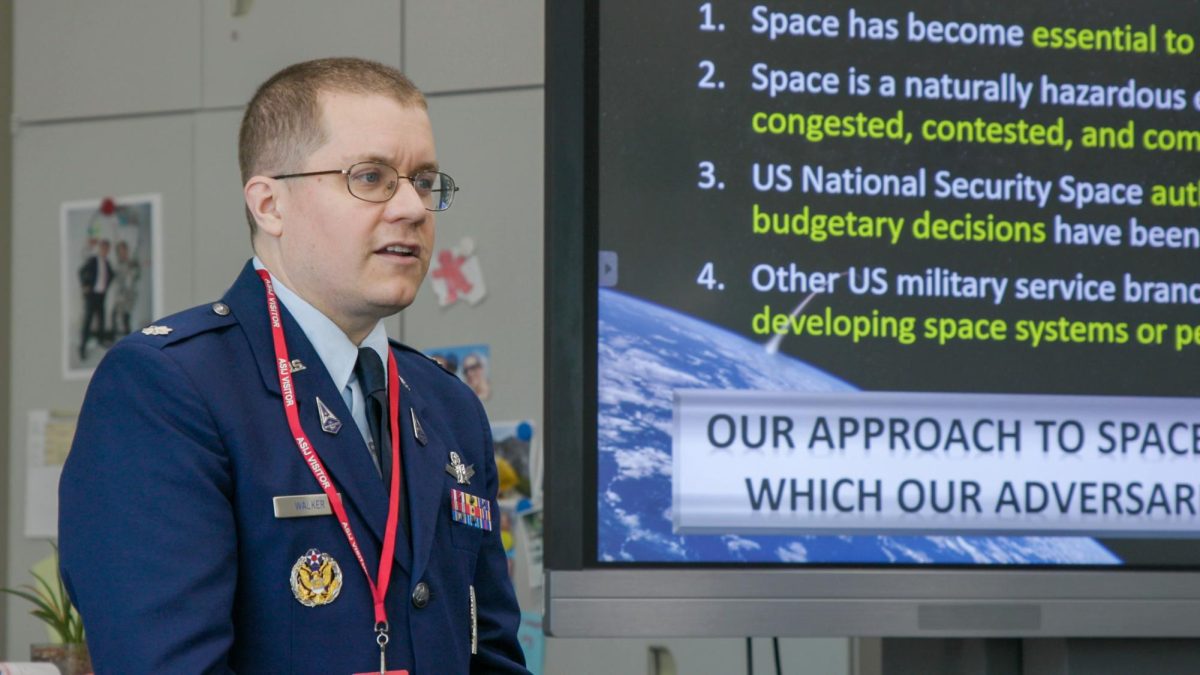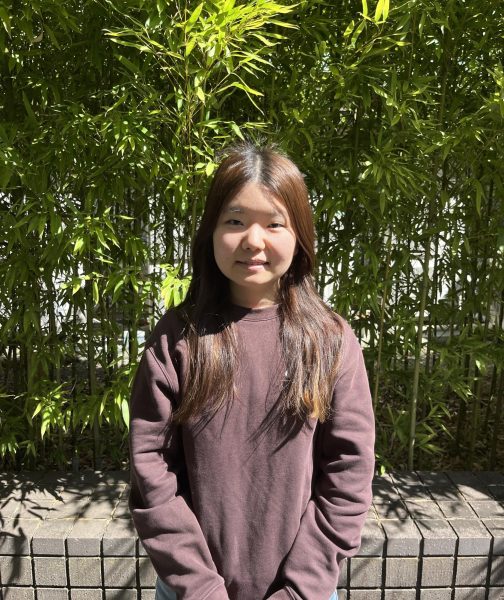On March 13th, ASIJ’s Aerospace Club invited Lieutenant Colonel Geoffrey H. Walker to share his experiences in the U.S. Space Force and insights on the evolving intersections between space exploration and political interests. The event, held after school, provided attendees with a unique opportunity to gain firsthand insights into the Colonel’s roles involving intercontinental ballistic missiles (ICBMs), the establishment of the Space Force during the Trump administration, and his experience in expanding a Japan branch of the force.
“In past events that the Aerospace Club has held, it was mostly about space exploration and scientific developments. We hosted the Lieutenant [Colonel] because his work was centered around the idea of national defense and international interest—that’s a fresh and interesting lens to look at space,” Mutsuki Tanabe (‘24), one of the event organizers, said.
Established in 2019, the U.S. Space Force serves as the space service branch of the U.S. Armed Forces, operating within the Department of the Air Force and overseen by the Secretary of the Air Force. “Our focus is national security, space warfare, and space defense,” Lt. Col. Walker said. “We actually designed [Space Force] after the way that the Marine Corps was built. We’re a military organization.”
Since the inception of the Space Corps—a predecessor of the Space Force—in 1989, there have been inconsistencies in determining authority, responsibility, and decision-making processes regarding space-related endeavors, Lt. Col. Walker explained. Advancement of space technology and the development of capable personnel was lacking, despite the escalating congestion in space and the spillover of geopolitical tensions into outer space. According to Lt. Col. Walker, the creation of the Space Force was an effort to adopt a more “defensive and protective” stance towards space operations.
Besides bureaucratic inefficiencies, Lt. Col. Walker emphasized that a significant factor driving the creation of the Space Force was the United States’ softer approach to space operations. “How we approached space created vulnerabilities. Our adversaries look for vulnerabilities, and we look to protect those vulnerabilities,” Lt. Col. Walker said.
Birthed from the Cold War, space exploration has traditionally been shaped by the world’s most powerful nations. While formerly limited to a select few, space programs are now emerging globally, with 77 countries engaged in such endeavors. This includes established players like the U.S. and China, as well as newer entrants such as Vietnam and India.

“Space is hard; it’s really difficult, and it’s getting worse because it is increasingly congested, contested, and competitive,” Lt. Col. Walker said. “When I first started, we had 20 to 30 satellites. Today, we’ve got well over 250 now, and growing probably into the thousands here very shortly—and that’s just on the U.S. side.”
The Lieutenant Colonel’s words follow China’s ongoing testing and development of various space weapons and technologies aimed at disrupting, disabling, or taking control of satellites critical to the operations of the U.S. military. “International law actually says very little about space, so there are a lot of other ways to threaten and fight in space. We need to be prepared to defend against those things,” Lt. Col. Walker said.
Except for the ban on weapons of mass destruction in space, the 1967 Outer Space Treaty—which stands as one of the few regulatory frameworks governing actions in space—says little about militarization and aggression. The emergence of small satellites and increasing privatization of space activities has made delineating these legal boundaries even more challenging in recent years.
Much of Lt. Col. Walker’s efforts in establishing the Space Force’s presence in Japan at the Yokota Air Base involve fostering alliances amid the escalating congestion in outer space, driven by various nations seeking to militarize space for their own political objectives. Throughout his presentation, the Lieutenant Colonel also addressed topics such as orbital physics, the administrative structure of the Space Force, and the educational qualifications necessary for joining.
Exploring the intersection of space and geopolitics was a key highlight for many attendees. “I didn’t expect to learn about the intersectionality between the science, the military and defense, as well as policy-making,” Eigen Schinaman (‘24) said. Aska Emery (‘24) agrees. “I learned a lot about international law—it’s shocking that you can bring a satellite up and there is no law that really prohibits you from putting it up there,” he said.
As a relatively new branch of the armed forces, students also gained valuable insight into the day-to-day operations of the Space Force. “This was really my first time interacting with anyone from the Space Force in particular, and I didn’t really have a lot of knowledge to do with it, so it was really interesting getting to speak with someone that has a lot of expertise and that knows its operations,” Reina Radnor (‘25) said.
With geopolitical tensions spilling over into outer space and entities like the Space Force growing “as fast as [they] possible can,” tales of intergalactic conflicts depicted in science fiction stories may not be entirely far-fetched.
“Our approach to space was friendly, open, not suspicious, and not with defense in mind,” Lt. Col. Walker said. But that approach, he explained, is no longer feasible. “That is probably the biggest reason why we needed a Space Force.”


